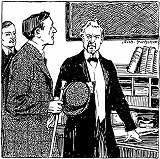Holmes replaced the bill in his notebook. “If you prefer a public explanation, it must come sooner or later,” said he. “I have already told you that I can hush up that which others will be bound to publish, and you would really be wiser to take me into your complete confidence.”
“I know nothing about it.”
“Did you hear from Mr. Staunton in London?”
“Certainly not.”
“Dear me, dear me - the postoffice again!” Holmes sighed, wearily. “A most urgent telegram was dispatched to you from London by Godfrey Staunton at six-fifteen yesterday evening - a telegram which is undoubtedly associated with his disappearance - and yet you have not had it. It is most culpable. I shall certainly go down to the office here and register a complaint.”
Dr. Leslie Armstrong sprang up from behind his desk, and his dark face was crimson with fury.

“I’ll trouble you to walk out of my house, sir,” said he. “You can tell your employer, Lord Mount-James, that I do not wish to have anything to do either with him or with his agents. No, sir - not another word!” He rang the bell furiously. “John, show these gentlemen out!” A pompous butler ushered us severely to the door, and we found ourselves in the street. Holmes burst out laughing.
“Dr. Leslie Armstrong is certainly a man of energy and character,” said he. “I have not seen a man who, if he turns his talents that way, was more calculated to fill the gap left by the illustrious Moriarty. And now, my poor Watson, here we are, stranded and friendless in this inhospitable town, which we cannot leave without abandoning our case. This little inn just opposite Armstrong’s house is singularly adapted to our needs. If you would engage a front room and purchase the necessaries for the night, I may have time to make a few inquiries.”
These few inquiries proved, however, to be a more lengthy proceeding than Holmes had imagined, for he did not return to the inn until nearly nine o’clock. He was pale and dejected, stained with dust, and exhausted with hunger and fatigue. A cold supper was ready upon the table, and when his needs were satisfied and his pipe alight he was ready to take that half comic and wholly philosophic view which was natural to him when his affairs were going awry. The sound of carriage wheels caused him to rise and glance out of the window. A brougham and pair of grays, under the glare of a gas-lamp, stood before the doctor’s door.
“It’s been out three hours,” said Holmes; “started at half-past six, and here it is back again. That gives a radius of ten or twelve miles, and he does it once, or sometimes twice, a day.”
“No unusual thing for a doctor in practice.”
“But Armstrong is not really a doctor in practice. He is a lecturer and a consultant, but he does not care for general practice, which distracts him from his literary work. Why, then, does he make these long journeys, which must be exceedingly irksome to him, and who is it that he visits?”
“His coachman- -”
“My dear Watson, can you doubt that it was to him that I first applied? I do not know whether it came from his own innate depravity or from the promptings of his master, but he was rude enough to set a dog at me. Neither dog nor man liked the look of my stick, however, and the matter fell through. Relations were strained after that, and further inquiries out of the question. All that I have learned I got from a friendly native in the yard of our own inn. It was he who told me of the doctor’s habits and of his daily journey. At that instant, to give point to his words, the carriage came round to the door.”
“Could you not follow it?”